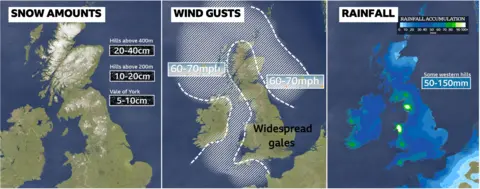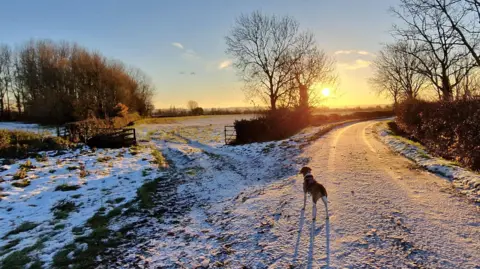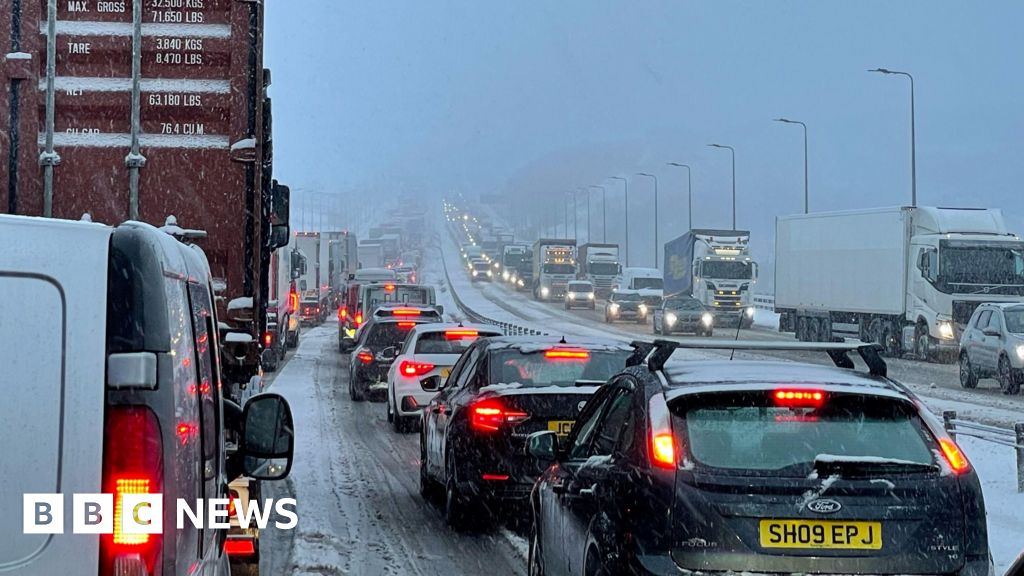Storm Bert is hitting the UK with snow, heavy rain and strong winds causing travel disruption on roads and railways.
There is an amber warning for snow in Scotland and another for snow and ice in north-east England on Saturday.
A futher six yellow warnings for rain and wind are in place across the UK. The Met Office is calling Storm Bert a “multi-hazard weather event”.
Rail companies urged passengers to avoid travelling to certain areas, while a number of roads have been closed.
An amber warning means there is an increased risk to life and property, as well as the likelihood of severe weather causing travel delays, road closures and power cuts.
A yellow warning is mainly issued when it is likely that the weather will cause some low level impacts.
Areas in Scotland and north-east England will be most affected by snow, while strong winds will be felt the most in Wales and the north and south-east of England. Heavy rainfall is expected across the UK.
The storm follows a cold snap this week, which caused some schools to close in several parts of the UK.
Higher ground in northern England and the hills of Scotland could get 20-40cm of snow, posing the risk of significant disruption on roads.
But it is affecting lower areas too. There has already been snowfall in north-east England and Scotland.
National Highways issued a severe weather alert for snow on roads in Yorkshire and north-east England as it expects blizzard conditions. It says snow is set to “accumulate quickly at all levels”.
Parts of several A-roads in England are closed due to snow, National Highways says, with traffic delays expected.
Snow coming down in wet, chunky flakes is also likely to cause power cuts as it sticks to power cables and tree branches, which may snap under the extra weight.
Across south-west England and Wales, a Met Office yellow warning for rain says that, throughout Saturday, 50-75mm (2-3in) of rain could fall widely.
The heaviest and most persistent rain will fall in south Wales and south-west England, where there could be as much as 150mm (6in) – which would be the whole of November’s average rainfall in just a day.
Incessant rain is expected to last for many hours, with some flooding likely later today and into Sunday.
 BBC Weather
BBC WeatherA period of strong winds is also likely on Saturday, with peak gusts of up to 70mph felt across western coasts of the UK. Gusts have already been recorded reaching 67mph in Scilly and Devon.
Gales are forecast to spread inland, affecting many areas. These winds will be strong enough to bring down some tree branches.
National Highways says the Severn Bridge (M48) – connecting Gloucestershire and south Wales – has been closed in both driections due to the strong winds.
Ferry companies have also been affected. Operator CalMac – which serves the west coast of Scotland – has cancelled several services on Saturday.
P&O Ferries said it had also cancelled a service.
Rail operators have also announced schedule changes due to Storm Bert.
TransPennine Express “strongly” urged customers not to travel north of Carlisle on Saturday while Avanti West Coast advised passengers not to travel north of Preston.
In Scotland, there will be speed restrictions on several lines covering the Highlands and the Glasgow South Western Line.
ScotRail has withdrawn multiple services and South Western Rail asked passengers to only travel west of Basingstoke if their journeys are essential.
 BBC Weather Watchers/Helen Earth
BBC Weather Watchers/Helen EarthThe Met Office has issued a number of weather warning for Saturday and Sunday:
- An amber warning for snow and ice for parts of the Highlands, Aberdeenshire, Perth and Kinross and Angus from 07:00 until 17:00 GMT on Saturday
- An amber warning for snow for parts of north-east and north-west England, and parts of the Scottish borders and south-west Scotland, from 07:00 until 12:00 on Saturday
- A yellow warning for rain and snow covering Northern Ireland from midnight until 11:00 on Saturday
- A yellow warning for wind in the Highlands from 09:00 to 21:00 on Sunday
- A yellow warning for rain for all of Wales and the West Midlands from 06:00 on Saturday until 06:00 on Sunday
- A yellow warning for rain and snow for most of northern England and Scotland from 04:00 on Saturday until 09:00 on Sunday
- A yellow warning for wind for much of the western coast of Scotland and north-west England, as well as north Wales and northern Ireland from 05:00 to 19:00 on Saturday
- A yellow warning for wind in Northern Ireland from 04:00 on Saturday to 09:00 on Sunday
- A yellow warning for wind for the eastern coast of Scotland and north-east England from 05:00 to 19:00 on Saturday
- A yellow warning for wind for London, the south-west of England, the south-east of England and Wales from 15:00 on Saturday until 21:00 on Sunday
Areas of the Republic of Ireland have been hit by flooding, including Killybegs, in County Donegal. The west of the country appears to be worst-affected by Storm Bert.
Some 60,000 customers are without power across the country.
A red warning for rain was in place for some parts of Cork and Galway until 10:00. Yellow weather warnings are still in place for all regions of Ireland.
An amber cold health alert is also in place for much of England until 18:00 on Saturday.
It means there is an increased health risk to vulnerable people, and the UK Health Security Agency (UKHSA) has urged people to check on those who may be at risk.
Some people may be eligible for cold weather payments – a government benefit top-up to help with fuel bills during times of exceptionally cold weather.


